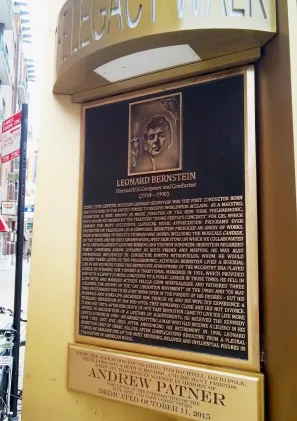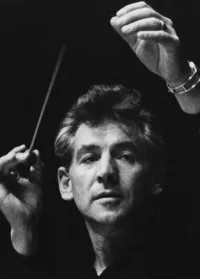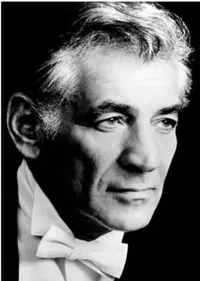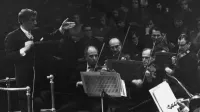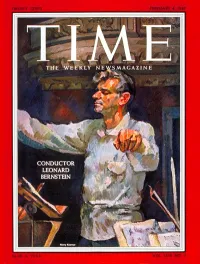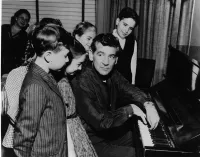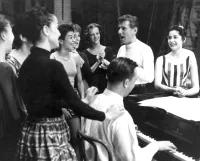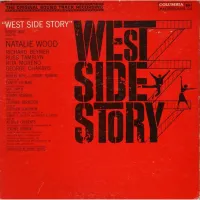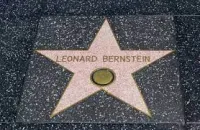Plaque Sponsor
WFMT, The Alphawood Foundation, Tom Bachtell, David Polk, Steve Robinson and Beth Schenker and his many friends dedicate this in memory of Andrew Patner who lived at the intersection of the fine arts and LGBT communitiesBiography
1918 - 1990
"Music ... can name the un-nameable and communicate the unknowable."
- Leonard Bernstein
Iconic 20th century musician Leonard Bernstein was the first conductor born and educated in the United States to receive worldwide acclaim. As a maestro, Bernstein is best known as music director of the New York Philharmonic, with whom he presented the televised “Young People’s Concerts” for CBS, which remain the most successful classical music appreciation programs ever presented on television. As a composer, Bernstein produced an array of works, from symphonies to ballets to Broadway shows, including the musicals Candide, On the Town, and his best-known work, West Side Story, on which he collaborated with Arthur Laurents, Jerome Robbins and Stephen Sondheim. Bernstein regarded famed composer Aaron Copland as both friend and mentor. He was also profoundly influenced by conductor Dimitri Mitropoulos, whom he would succeed years later at the Philharmonic. Although Bernstein lived a bisexual life in his younger years, the repressive atmosphere of the McCarthy era played a role in steering him toward a traditional marriage in 1951, which provided him with a lifestyle more conducive to a public career in those times. He fell in love with and married actress Felicia Cohn Montealegre and fathered three children. The advent of the “Gay Liberation Movement” of the 1960s and 70s may have encouraged him to be a bit more open in the pursuit of his desires – but his marriage and home-life anchored him. Though he and his wife did experience a yearlong separation in the mid-1970s, they remained close and did not divorce. It was not until after her death in 1978 that Bernstein came to live his life more openly. In recognition of a lifetime of achievements, he received the Kennedy Center Honors in 1980 – an award befitting a man who had become a legend in his own time. Just five days after announcing his retirement in 1990, Leonard Bernstein died of heart failure after complications resulting from a pleural tumor. He remains one of the most enduring, beloved and influential figures in the history of American music.
1918 - 1990
"Music ... can name the un-nameable and communicate the unknowable."
- Leonard Bernstein
Iconic 20th century musician Leonard Bernstein was the first conductor born and educated in the United States to receive worldwide acclaim. As a maestro, Bernstein is best known as music director of the New York Philharmonic, with whom he presented the televised “Young People’s Concerts” for CBS, which remain the most successful classical music appreciation programs ever presented on television. As a composer, Bernstein produced an array of works, from symphonies to ballets to Broadway shows, including the musicals Candide, On the Town, and his best-known work, West Side Story, on which he collaborated with Arthur Laurents, Jerome Robbins and Stephen Sondheim. Bernstein regarded famed composer Aaron Copland as both friend and mentor. He was also profoundly influenced by conductor Dimitri Mitropoulos, whom he would succeed years later at the Philharmonic. Although Bernstein lived a bisexual life in his younger years, the repressive atmosphere of the McCarthy era played a role in steering him toward a traditional marriage in 1951, which provided him with a lifestyle more conducive to a public career in those times. He fell in love with and married actress Felicia Cohn Montealegre and fathered three children. The advent of the “Gay Liberation Movement” of the 1960s and 70s may have encouraged him to be a bit more open in the pursuit of his desires – but his marriage and home-life anchored him. Though he and his wife did experience a yearlong separation in the mid-1970s, they remained close and did not divorce. It was not until after her death in 1978 that Bernstein came to live his life more openly. In recognition of a lifetime of achievements, he received the Kennedy Center Honors in 1980 – an award befitting a man who had become a legend in his own time. Just five days after announcing his retirement in 1990, Leonard Bernstein died of heart failure after complications resulting from a pleural tumor. He remains one of the most enduring, beloved and influential figures in the history of American music.
Lesson Plan
Please login or register for an account to view this lesson plan.
Demography
Demography
Gender Male
Sexual Orientation Bisexual
Gender Identity Cisgender
Ethnicity Caucasian/White
Nations Affiliated United States
Era/Epoch Cold War (1945-1991) Information Age (1970-present)
Field(s) of Contribution
Advocacy & Activism
Art, Music, Literature & Theater
Education
Film
Media & Communications
Music
Social Justice
Social Sciences
Television
Theater
US History
Commemorations & Honors
Multiple Grammy Award Winner
American Academy of Arts and Sciences Fellow (1951)
Tony Award Best Musical for Wonderful Town (1954)
Hollywood Walk of Fame Star For Recording (1960)
Special Tony Award (1969)
American Theater Hall of Fame Inductee (1972)
George Peabody Medal – Johns Hopkins University (1980)
Kennedy Center Honoree (1980)
Grammy Lifetime Achievement Award (1985)
Commandeur de la Légion d'honneur (1986)
Ernst von Siemens Music Prize (1987)
Royal Philharmonic Society Gold Medal- UK (1987)
Knight Grand Cross Order of Merit- Italy (1987)
Television Hall of Fame Inductee (1990)
Google Doodle Commemorating Bernstein's 100th Birthday (2018)
Demography
Gender Male
Sexual Orientation Bisexual
Gender Identity Cisgender
Ethnicity Caucasian/White
Nations Affiliated United States
Era/Epoch Cold War (1945-1991) Information Age (1970-present)
Field(s) of Contribution
Advocacy & Activism
Art, Music, Literature & Theater
Education
Film
Media & Communications
Music
Social Justice
Social Sciences
Television
Theater
US History
Commemorations & Honors
Multiple Grammy Award Winner
American Academy of Arts and Sciences Fellow (1951)
Tony Award Best Musical for Wonderful Town (1954)
Hollywood Walk of Fame Star For Recording (1960)
Special Tony Award (1969)
American Theater Hall of Fame Inductee (1972)
George Peabody Medal – Johns Hopkins University (1980)
Kennedy Center Honoree (1980)
Grammy Lifetime Achievement Award (1985)
Commandeur de la Légion d'honneur (1986)
Ernst von Siemens Music Prize (1987)
Royal Philharmonic Society Gold Medal- UK (1987)
Knight Grand Cross Order of Merit- Italy (1987)
Television Hall of Fame Inductee (1990)
Google Doodle Commemorating Bernstein's 100th Birthday (2018)
Resources
Resources
Burton, Humphrey. Leonard Bernstein. New York: Doubleday, 1994.
Burton, Willi Westbrook, ed. Conversations about Bernstein. New York: Oxford University Press, 1995.
Myers, Paul. Leonard Bernstein. London: Phaidon, 1998.
Peyser, Joan. Bernstein: A Biography. Rev. ed. New York: Billboard Books, 1998.
Secrest, Meryle. Leonard Bernstein: A Life. New York: Knopf, 1994.
http://www.thejc.com/lifestyle/lifestyle-features/68838/leonard-bernstein-my-wonderful-dad
https://www.npr.org/sections/deceptivecadence/2018/08/25/638625561/life-with-leonard-bernstein
http://www.out.com/entertainment/theater/2010/10/18/leonard-bernstein-soul-mining
http://www.solidarity-us.org/site/node/2620
http://www.nytimes.com/2013/12/15/books/review/the-leonard-bernstein-letters.html
Resources
Burton, Humphrey. Leonard Bernstein. New York: Doubleday, 1994.
Burton, Willi Westbrook, ed. Conversations about Bernstein. New York: Oxford University Press, 1995.
Myers, Paul. Leonard Bernstein. London: Phaidon, 1998.
Peyser, Joan. Bernstein: A Biography. Rev. ed. New York: Billboard Books, 1998.
Secrest, Meryle. Leonard Bernstein: A Life. New York: Knopf, 1994.
http://www.thejc.com/lifestyle/lifestyle-features/68838/leonard-bernstein-my-wonderful-dad
https://www.npr.org/sections/deceptivecadence/2018/08/25/638625561/life-with-leonard-bernstein
http://www.out.com/entertainment/theater/2010/10/18/leonard-bernstein-soul-mining
http://www.solidarity-us.org/site/node/2620
http://www.nytimes.com/2013/12/15/books/review/the-leonard-bernstein-letters.html
